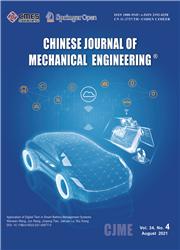基于降维映射的曲面五轴加工动力学分析新模型
IF 4.5
2区 工程技术
Q1 Engineering
引用次数: 0
摘要
在各个领域中使用的设备包含越来越多的零件,其曲面尺寸也越来越大。五轴数控(CNC)铣削是主要的零件加工方法,而动力学分析一直是研究的热点。由刀具轴线、刀具轨迹和工件几何形状决定的切削条件是复杂多变的,这使得动力学研究成为一项重大挑战。为此,本文引入了将降维和映射应用于曲面五轴加工的创新思想,并提出了一种高效的动力学分析模型。为了简化研究对象,将沿刀具轨迹的刀具位置点离散为斜面五轴加工。在五轴加工中,刀具倾角和进给挠度定义了空间位置关系。然后将这些作为新的基变量,构建抽象的二维空间,建立刀具位置点与空间点集的映射关系,进一步简化研究对象的尺寸。以空间限制法求解的切削刃为基础,对斜面五轴加工单元的动力学特性进行了研究,并将研究结果统一存储在抽象空间中形成数据库。最后,沿刀具轨迹的铣削力和振动状态的预测成为一个数据提取过程,显著提高了效率。通过两个实验验证了所提动力学分析模型的准确性和有效性。该研究对大型曲面智能加工的在线同步具有很大的潜力。本文章由计算机程序翻译,如有差异,请以英文原文为准。
A New Dynamics Analysis Model for Five-Axis Machining of Curved Surface Based on Dimension Reduction and Mapping
Abstract The equipment used in various fields contains an increasing number of parts with curved surfaces of increasing size. Five-axis computer numerical control (CNC) milling is the main parts machining method, while dynamics analysis has always been a research hotspot. The cutting conditions determined by the cutter axis, tool path, and workpiece geometry are complex and changeable, which has made dynamics research a major challenge. For this reason, this paper introduces the innovative idea of applying dimension reduction and mapping to the five-axis machining of curved surfaces, and proposes an efficient dynamics analysis model. To simplify the research object, the cutter position points along the tool path were discretized into inclined plane five-axis machining. The cutter dip angle and feed deflection angle were used to define the spatial position relationship in five-axis machining. These were then taken as the new base variables to construct an abstract two-dimensional space and establish the mapping relationship between the cutter position point and space point sets to further simplify the dimensions of the research object. Based on the in-cut cutting edge solved by the space limitation method, the dynamics of the inclined plane five-axis machining unit were studied, and the results were uniformly stored in the abstract space to produce a database. Finally, the prediction of the milling force and vibration state along the tool path became a data extraction process that significantly improved efficiency. Two experiments were also conducted which proved the accuracy and efficiency of the proposed dynamics analysis model. This study has great potential for the online synchronization of intelligent machining of large surfaces.
求助全文
通过发布文献求助,成功后即可免费获取论文全文。
去求助
来源期刊

Chinese Journal of Mechanical Engineering
ENGINEERING, MECHANICAL-
CiteScore
5.60
自引率
4.80%
发文量
3097
审稿时长
8 months
期刊介绍:
Chinese Journal of Mechanical Engineering (CJME) was launched in 1988. It is a peer-reviewed journal under the govern of China Association for Science and Technology (CAST) and sponsored by Chinese Mechanical Engineering Society (CMES).
The publishing scopes of CJME follow with:
Mechanism and Robotics, including but not limited to
-- Innovative Mechanism Design
-- Mechanical Transmission
-- Robot Structure Design and Control
-- Applications for Robotics (e.g., Industrial Robot, Medical Robot, Service Robot…)
-- Tri-Co Robotics
Intelligent Manufacturing Technology, including but not limited to
-- Innovative Industrial Design
-- Intelligent Machining Process
-- Artificial Intelligence
-- Micro- and Nano-manufacturing
-- Material Increasing Manufacturing
-- Intelligent Monitoring Technology
-- Machine Fault Diagnostics and Prognostics
Advanced Transportation Equipment, including but not limited to
-- New Energy Vehicle Technology
-- Unmanned Vehicle
-- Advanced Rail Transportation
-- Intelligent Transport System
Ocean Engineering Equipment, including but not limited to
--Equipment for Deep-sea Exploration
-- Autonomous Underwater Vehicle
Smart Material, including but not limited to
--Special Metal Functional Materials
--Advanced Composite Materials
--Material Forming Technology.
 求助内容:
求助内容: 应助结果提醒方式:
应助结果提醒方式:


